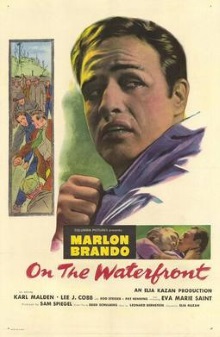
Going back to the well of classic Hollywood films, here is one that was directed by Elia Kazan and stars Marlon Brando. We’ve already watched the earlier A Streetcar Named Desire that the two also worked on and loved it so I was hoping for more of that magic. Though ostensibly about mobsters who have taken over a union of dock workers, this film can also be read as Kazan’s response to his critics over his willingness to cooperate with the House Committee on Un-American Activities to root out suspected Communists in Hollywood.
Former boxer Terry Malloy is now a dockworker while his brother Charley is a close associate of the local union boss Johnny Friendly. One night he lures out another dockworker Joey Doyle, who is supposedly about to testify in court against Friendly, thinking the latter would only be given a talking to and is shocked when he is pushed off the roof to his death instead. The next day Joey’s sister Edie and the local priest are determined to get to the bottom of the murder. After an impassioned sermon in the church, the priest persuades another dock worker to testify. Meanwhile Terry who also attended the meeting under Friendly’s orders helps Edie escape when goons come up to rough up the attendees. Inevitably the two get close and Terry feels pressured to confess his involvement in Joey’s death, especially after the second worker is killed as well.
This is a film that I think was groundbreaking in its time for its detailed and frank portrayal of how the mob controls the docks through violence and intimidation. It is very well made and Marlon Brando gives the main character a highly unusual combination of being both somewhat dim-witted and yet sensitive. It is quite extraordinary how Brando makes every character he plays interesting and unique. Still, modern audiences are inured to levels of brutality that are much higher than this so the level of violence here is now pretty unremarkable. As cruel as Friendly’s crew is for example, they still exercise enough restraint that a man of the cloth is beyond reprisal and that they are polite enough to get a man out of his house before killing him.
I do get that a big part of this film’s theme is that so long as the majority are too fearful to act, evil men only need to do relatively little to keep them in line. The alienation imposed by the community on anyone who attempts to break the status quo is well done and in this case it’s particularly cutting how even the children know how to do it. At the same time, the rot seems pretty much local as the police and the Waterfront Crime Commission seems both competent and determined to root out wrongdoing, so it’s not as if Terry is truly alone. Once you’ve watched something like The Wire which examines how crime and corruption affects every institution of society, something like this seems rather underwhelming.
All in all, I’d consider this to be a solidly good film with Brando’s performance being the highlight. But its impact is muted by modern standards and circumstances so I don’t think it’s quite on the same level as the other Hollywood classics.